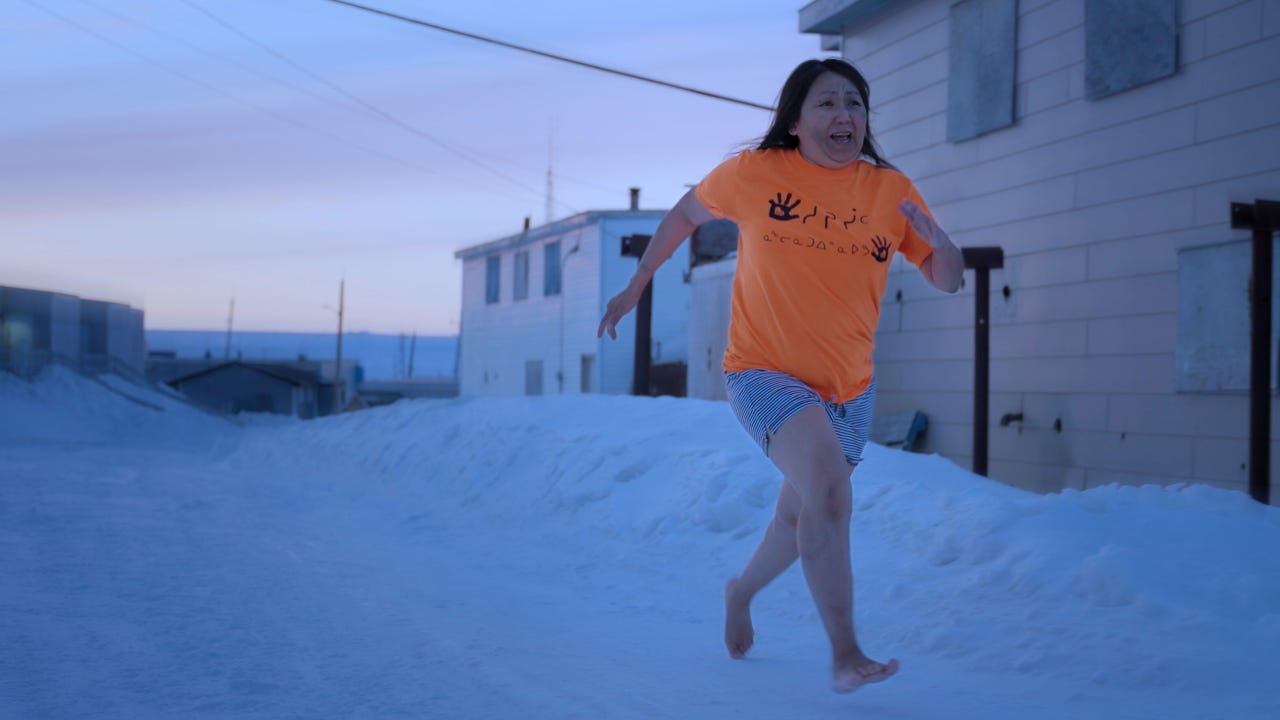It took me three sees of Tautuktavuk to understand the film more fully, and still I marvel at what I don’t yet know. I see that the North is spectacular in wide and medium shots, the sun a thumbprint and shimmering orb on fresh, packed snow. Inuit attend to their daily lives—strangers at the door, elders, friends, children and grandchildren—in tender ways that seem so because they are only going about their days. Tenderness shows itself by its nirvana, an awareness and oblivion to oneself.
Carol Kunnuk and Lucy Tulugarjuk play two sisters, the elder Saqpinak and the younger Uyarak, who live in Igloolik and Montreal, respectively. (In a press briefing, it was noted that the “k” at the end of the word Tautuktavuk “makes it two people’s point of view of the world.”) Separated by more than 2,000 kilmotres during the pandemic, the two sisters catch up and reveal their thoughts and memories to each other through Zoom calls. Uyarak and Saqpinak relay to each other separate traumas and abuses that have brought haunting and hardship to their lives. Uyarak does make the trip north to visit her family when COVID restrictions ease, met with words about the scolding of one in public—how private and public have been kept separate.

It’s touching to see tradition with modernity parallel to it. Nature is not a companion or an accessory but a being that inhabits space. This is the way people live. Saqpinak works for a local television station and interviews community members singing ajaajaa songs once considered a “taboo” by the church. The film touches on themes of two-eyed seeing (which stems from the Mi’kmaq term Etuaptmumk, translating to ‘the gift of multiple perspectives’). Western knowledge has in many ways been unwanted, but Western science now innoculates people of Igloolik against the coronavirus. The hesitancy and mistrust is understandable. In the film it is not an irony but a reality, which is hard to do. There’s loving in every facial expression.
In one of my favourite scenes, Uyarak gets her forearms tattooed at her friend Beatrice’s home. You can hear the needle going in the skin. It doesn’t hurt, Uyarak says, but you can see emotion swelling. “I am feeling proud,” she says. Her mother was threatened by religious authorities who banned tattoos, an integral part of Inuit culture. Time passes quickly — all done already, Uyarak remarks. Yet we do not see this manner in which time passes in film that permeates the mainstream.
Tautuktavuk won the Amplify Voices Award for Best BIPOC Canadian First Feature film at TIFF and the 2023 Sun Jury Award at imagineNATIVE Film + Media Arts Festival this fall. It has also been named one of TIFF’s Canada’s Top 10 films this year. Tautuktavuk tells viewers of the impact COVID has had on 22 communities in Nunavut: its isolating effect, how reports of domestic violence rose, the health effects of exposures to the virus. Carefully, with craft, the film also considers isolation and grief in a more global way.
People have described the film as a hybrid, blending reality and fiction. In my view, the film considers what it means to have thoughts and feelings heightened through speech. “I dreamt I was running and it felt so real,” Uyarak says to Saqpinak. What is true—which can be phantom, inexplicable—becomes adjacent to one’s emotional reality, how one copes with it through the telling of events in the mind and in the flesh. It is perhaps most important whom one chooses to confide in and how they respond.
I spoke with co-director Lucy Tulugarjuk this fall, shortly after Tautuktavuk had its world premiere at TIFF and played at the Atlantic International Film Festival in Halifax, N.S. If you are interested in reading more about the production and behind the scenes of the film, whose cast compromises non-professional actors, you can find it on Inuit Art Quarterly’s website.

Leave a comment